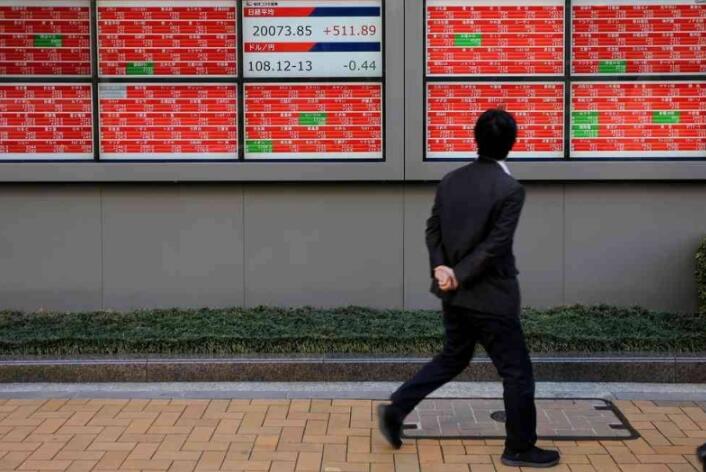Asian shares opened cautiously today as a slew of weak U.S. data pointed to downside risks to this week's June jobs report, while clamor over a possible recession is still fueling a relief rally in government bonds.
The search for safety kept the dollar near 20-year highs, although early action was muted as U.S. markets were on holiday.
Cash Treasuries closed, butfuturesTYc1 extended gains, meaning the 10-year Treasury yield held around 2.88%, down 61 basis points from its June peak.
MSCI's broadest index of Asia-Pacific shares outside Japan edged up 0.3 percent, while Japan's Nikkei added 0.9 percent.
However, S&P 500futuresand Nasdaqfuturesboth fell 0.4%, stabilizing only marginally on Friday.

Goldman Sachs analyst David J. Kostin noted that, amid extreme volatility, every sector in the S&P 500, energy, posted negative returns in the first half of the year.
"The current bear market is entirely driven by valuations and not the result of lower earnings expectations," he added.
"However, we expect consensus margin forecasts to decline, which will lead to earnings-per-share downward revisions, regardless of recession." Earnings season begins July 15 with significantly lower expectations given high costs and weak data.
The Atlanta Fed's closely watched GDP Now forecast has slipped to an annualized -2.1% in the second quarter, meaning the country is already in a technical recession.
Friday's jobs report is expected to show job growth slowed to 270,000 in June and average earnings to slow to 5.0%.
However, the minutes of the Fed's June policy meeting on Wednesday almost certainly sounded hawkish given the committee's choice to raise rates by 75 basis points.
Market 0#FF: Pricing around an 85% chance of another 75bps rate hike this month, with rates at 3.25-3.5% by year-end.
"But the market is also starting to price in deeper and deeper Fed rate cuts in 2023 and 2024, consistent with the increasing likelihood of a recession," NAB analysts noted.
“The Fed is now expected to cut rates by around 60 basis points through 2023.” In currencies, investor demand for the most liquid safe haven tends to benefit the greenback, which traded near a two-year high of 105.04 against a basket of rivals.
The euro was flat at $1.0433 (RM6.32), not far from its most recent five-year low of $1.0349.The European Central Bank is expected to raise interest rates for the first time in a decade this month, and the euro could get a boost if it decides to take a more aggressive half-point move.
The yen also attracted some safe-haven inflows late last week, pulling the dollar back to 135.00 yen from a 24-year high of 137.01.
A higher dollar and rising interest rates are bad for non-yielding gold, which fell as low as $1,808 an ounce after hitting a six-month low last week.Fears of a global recession also weakened industrial metals, with copper hitting a 17-month low, down 25% from its March peak.
Oil generally performed better as supply constraints and the conflict in Ukraine offset demand concerns.
Output curbs in Libya and a planned strike by oil and gas workers in Norway are just the latest blows to production.O/R Still, sellers were out in early trade today, with Brent down 34 cents to $111.29 and U.S. crude CLc1 down 23 cents to $108.20 a barrel.




